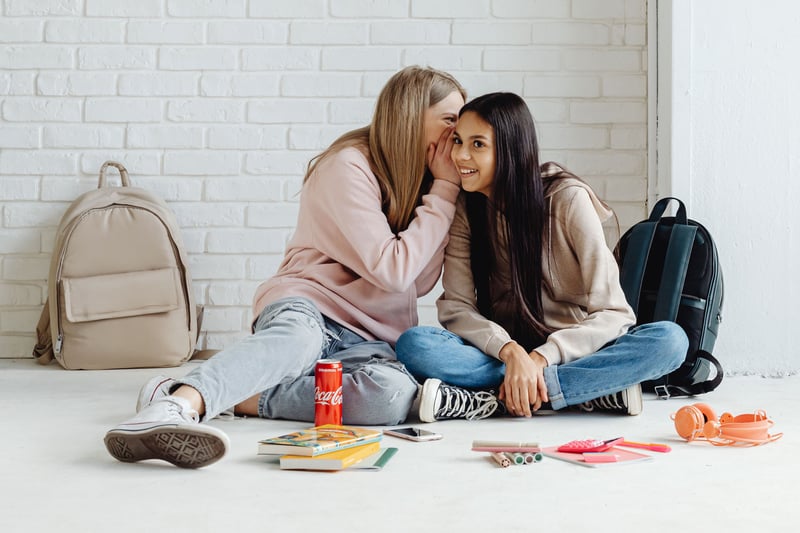
As young as eight, I would hop on my bike after school, cycle a few blocks and knock on my friend's door to see if they could play. We would kick balls in the street or ride to the woods for fort building and games of tag and 'capture the castle'. If my parents worried, they never showed it.
Sadly, the golden age of unsupervised, free-range adventure is over for most kids. They are protected, escorted everywhere and constantly under an adult's watchful eye.
But time alone with friends, away from adult supervision, is vital to a child's development:
It encourages kids to develop real relationships rather than virtual ones
I have a nephew who spends his weekends playing computer games with his friends ... each in their own homes. They don't see each other. They barely speak to one another. But they will happily play Clash of Clans or Rocket League together without the inconvenience of social contact.
Even four years ago, Australian 6 to 13-year-olds were spending more time on the internet than socialising with friends (Source: Roy Morgan Research). Are we surprised that teenage depression and anxiety has escalated over the last five years?
If we want our kids to form healthy, genuine relationships with other human beings, they need to spend face-to-face leisure time with their peers.
It develops their imagination
Without an adult to structure their play, kids have to find their own ways of entertaining themselves. Child led play is very different to adult initiated play. My youngest child can spend hours lost in surreal Lego adventures with his friends; they fly to Saturn, build sushi bars and set traps for alien goats. To me, it sounds like fantastic nonsense, devoid of logic. If I were to join in, I'd be imposing my adult views, trying to create realistic story lines and questioning the veracity of the half man/half coffee machine character who drinks his own arm.
It teaches kids communication and conflict resolution skills
In the absence of an adult to explain the rules and intervene when others don't play fair, kids learn to negotiate and sort out their own problems. They learn how to co-operate, express their opinions effectively and accommodate other people's interests. These are important skills to take into the adult world.
It opens them up to different perspectives
Spending time at another child's house gives kids an insight into different family dynamics and behaviour.
One of my children recently made friends with a Korean boy at school and is enjoying learning about his culture and customs.
My youngest child asked if he could take over the job to unstack the dishwasher after discovering his friend had this responsibility in his household. Result!
Both my kids return from their friends' houses bubbling with ideas for family activities, holidays, games, managing workloads, homework planning and even bedroom decor! I can't say I intend to run with all of them but I love how they are questioning and thinking about these things. I did, however, end up buying a pet turtle (don't ask!).
It gives them a sense of independence and freedom
Kids feel more grown-up when not being supervised and micro-managed. Left alone with their friends they will:
- dare each other
- take more risks
- share secrets
- dream
- plot, plan and conspire
- challenge themselves
- make decisions and judgements autonomously and collectively
These are all important parts of growing up and help build confidence and resilience.

It gives kids space to vent
Yes, kids will moan about you to their friends. They may even make fun of you, call you names and do mean impersonations of your shouty voice. This doesn't mean they don't love you or think you're wonderful; sometimes they just need space to let off steam and offload their frustration.
Teenagers, especially, tend to open up and be more honest with friends their own age. They can express emotions in their own words, without censoring their language or opinions. And when they criticise their parents? Well sometimes it's the friends who will jump to your defence and reason with your child!
How to help your kids enjoy time alone with their friends
-
Provide a safe, comfortable space
This might be a den, treehouse or spare room in your house - or simply a time slot where you're happy to vacate the living room. -
Accept your role as taxi driver
Be prepared for the inconvenience of ferrying your children to and from friends' houses as you facilitate their social life! -
Respect their privacy
Resist the urge to enquire about every aspect of your child's life. Kids need to have secrets with their friends. Show courtesy and knock before entering their room. -
Don't barge in
Hold back. Don't jump in to resolve every disagreement and argument. Give your child and their friends time and space to resolve conflict on their own. Don't try to be besties with your kid's friends either. Be friendly and welcoming but avoid butting into their conversations or hanging out with them ... unless invited. -
Provide a way out
There may be a time when your child feels unsafe or uncomfortable when alone with friends. It's a good idea to have a pre-arranged 'exit strategy' with your child, should they ever need help getting away from an awkward or dangerous situation. This may be a code word or sentence, which is your cue to help your child out of there. You can read more about this in our blog, Raising Resilient Children.










